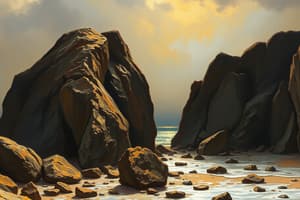Podcast
Questions and Answers
What are the three principal types of rocks?
What are the three principal types of rocks?
- Metamorphic (correct)
- Volcanic
- Igneous (correct)
- Sedimentary (correct)
Bioturbation is a process involved in the formation of sedimentary rocks.
Bioturbation is a process involved in the formation of sedimentary rocks.
True (A)
What is the primary factor contributing to metamorphism?
What is the primary factor contributing to metamorphism?
Heat
Rocks that are subjected to heat and pressure are known as ______.
Rocks that are subjected to heat and pressure are known as ______.
Match the following types of sedimentary rocks with their descriptions:
Match the following types of sedimentary rocks with their descriptions:
What occurs during the weathering process?
What occurs during the weathering process?
What are the examples of chemical sedimentary rocks?
What are the examples of chemical sedimentary rocks?
What is erosion?
What is erosion?
Flashcards are hidden until you start studying
Study Notes
Earth Science: Bioturbation
- Essential process impacting sediment characteristics through biological activities.
- Organisms like worms and burrowing animals disturb sediments, facilitating nutrient cycling.
Rocks
- Fundamental component of the geosphere; naturally occurring solid material composed of one or more minerals.
Rock Cycle
- Describes the transformation between the three main rock types: sedimentary, metamorphic, and igneous.
- Rocks can evolve from one type to another based on temperature and pressure conditions.
- Highlights potential for each rock type to change into the other through various geological processes.
Sedimentary Rocks
- Formed from the compaction and cementation of sediments.
- Types classified into two main categories:
- Detrital
- Composed of rock fragments.
- Includes conglomerates, breccias, sandstones, siltstones, and claystone.
- Chemical
- Result from the precipitation of minerals from solutions.
- Examples are carbonate-based minerals like limestone, chalk, travertine, and silica-based minerals like halite.
- Detrital
Metamorphic Rocks
- Created under intense heat and pressure within the Earth's crust.
- Formed from the transformation of igneous and sedimentary rocks through metamorphism.
- Most metamorphic processes occur at depths of 10 to 30 km (6 to 18 miles).
- Changes include alteration in mineral structure and physical properties without changing chemical composition.
Formation of Sedimentary Rocks
- Weathering
- The breakdown of solid rock materials through physical disintegration and chemical decomposition at or near Earth's surface.
- Erosion
- Removal of rock and soil materials caused by natural forces such as water, glaciers, waves, and wind.
Formation of Metamorphic Rocks
- Heat
- The primary factor in metamorphism, affecting the mineral structure of rocks.
- Sources of heat include underground magma (contact metamorphism), radioactive decay, and friction caused by plate tectonics.
Studying That Suits You
Use AI to generate personalized quizzes and flashcards to suit your learning preferences.




